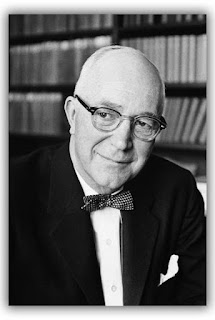The Inquisition is one of the darkest and least understood chapters in history, and yet, one cannot understand Christianity and the threat of Christian theocracy without delving into this horrifying part of the Christian legacy. In recently watching Secret Files of the Inquisition, I was surprised to discover just how much I did not know about this period. I had bought into many of the intentionally false claims made by Christian apologists without even knowing I was doing so.
7.31.2007
7.18.2007
Religious Intolerance: Christian Pot, Atheist Kettle
From a Christian perspective, spotting religious intolerance is a fairly simple matter. Odds are, if you are an atheist, you are intolerant. And yet, this is a simplicity based on irrationality and Christian privilege. What is religious intolerance, how should we recognize it, and is it an offense of which all atheists are guilty?
7.12.2007
Intrinsic vs. Extrinsic Religion
 |
| Gordon Allport |
While all varieties of religious belief share the flaws of irrationality and falsehood, there is evidence that some forms of religious belief are less damaging than others. In fact, the intrinsic-extrinsic dimension has been one of the most central constructs in the modern psychology of religion and remains popular in psychological research today.
It is difficult to read much on the psychology of religion without encountering Gordon Allport's work on intrinsic-extrinsic religion. Essentially, this dimension deals with maturity and is based on the assumption that some people hold more mature religious belief than others. It may be tempting for nonbelievers to dismiss this notion, especially when one learns that Allport developed it at least in part because he was troubled by the positive relationship between measures of religiosity and measures of prejudice.
Interesting how this works, isn't it? A researcher finds that religiosity is positively correlated with prejudice (i.e., people with higher reported religiosity report greater levels of prejudice), is puzzled by this finding, and decides that there must be something else going on besides the obvious explanation. Still, I think we can rest assured that there is a considerable body of scientific research supporting the utility of the I-E construct.
Simply put, an intrinsic (I) religious orientation is described as being more mature in that the believer views religion as an end unto itself. That is, the believer believes without clearly identifiable external motives for doing so. In contrast, an extrinsic (E) religious orientation is immature and is more of a means to some other end. That is, belief motivated by external factors (e.g., social acceptance, advancement, etc.). E (but not I) is correlated with prejudice.
7.11.2007
Darwin Fish Exposes Christian Privilege

I like the Darwin fish. To me, it is a healthy pro-science statement. Of course, I acknowledge that it also carries an anti-religion connotation for some people due to its design (i.e., borrowing from the Christian fish design) and the inevitable conflict between religion and science. I'm also aware that some people view displaying a Darwin fish as an act of symbolic aggression. More than just being an interesting symbol that is interpreted in diverse ways, the Darwin fish exposes the scope of Christian privilege and says volumes about the plight of nonbelievers.
I do not have a Darwin fish on my car, but I would like to. Why? I perceive it as one of the rare symbols which conveys both a pro-science and an anti-superstition sentiment simultaneously. Since I am both pro-science and anti-superstition, it is an unusually accurate symbol for my worldview. But the main reason I'd like to have one because of how it makes me feel when I see one on another vehicle. They are a rare sight around here, but when I glimpse one, it instantly puts a smile on my face. Suddenly I am no longer alone, even if only for a brief second on the road. I'd like to be able to spread that feeling to other secular persons.
7.03.2007
Atheists Owe Apology to Real Christians
| Paparazzo Presents a photo of televangelist Pat Robertson taken during his February 12, 2006 Operation Blessing visit to Victory Fellowship Church in Metairie, Louisiana. (Photo credit: Wikipedia) |
Christians are a diverse bunch. While they share some central tenets of Christianity, one can find a full spectrum from right-wing biblical literalists to progressives who interpret the same bible metaphorically. Fundamentalism may be a fast-growing segment of Christianity, but it is certainly not synonymous with Christianity.
We atheists often find ourselves confused over who is a "real Christian" and who is not. Pat Robertson, D. James Kennedy, and James Dobson certainly refer to themselves as Christians. In fact, it is not uncharacteristic of them to dismiss progressive to moderate Christians as not being "real Christians." On the other hand, I have heard countless moderate to progressive Christians insist that these men are extremists who do not represent Christianity at all. Progressive Christians often express embarrassment that these men even associate themselves with Christianity!
I suppose some confusion is understandable on our part, but this cannot excuse our error. And what exactly is this error? We are constantly describing certain individuals as Christian when they are not even close to being "real Christians." We then attack these false Christian straw men as if they represented Christianity when they most certainly do not.
Fear not - we can avoid this mistake rather easily. All we have to do is learn what Christians have long recognized: "Real Christians" do not behave in immoral ways. The second someone indulges in immoral behavior, the person ceases to be a "real Christian." Just like magic!
Remember Hitler? He might have been a Christian at one time, but the moment he started killing Jews, he was no longer a Christian. What about pastors who molest children? Once these were great Christians with large congregations. Now, not so much. Ted Haggard? Once a prominent Christian leader, but now...you get the idea.
Christians, we atheists have been too blind to see what has been right in front of our eyes the entire time. For that, we are sorry. We will never again accuse a Christian of hypocrisy because we will now recognize that this is not possible for a Christian. Once they've done something bad, they are magically no longer a "real Christian."
[End extreme sarcasm here]
7.02.2007
America is NOT a Christian Nation
One of the most common assertions one encounters by Christian extremists and even some moderate Christians on the political right is that America is a Christian nation. This claim has been thoroughly discredited in more sources than any individual could possibly compile. In fact, it is hard to imagine an atheist blogger who hasn't addressed this claim and one point or another. I realize that this post will do little to prevent the issue from recurring here, but at least I will have a prepared response ready for next time. And besides, the topic certainly fits with the current Blog Against Theocracy blogswarm.
Common Sources for the Christian Nation Claim
First, let's unpack the claim itself. Why might one argue that America is a Christian nation? As it turns out, there are many reasons. Here is a quick review of some of the most common:
- The majority of American citizens identify themselves as Christians on various surveys.
- The American government officially endorses or sponsors Christianity.
- Non-Christians have fewer rights than Christians because the law treats them differently.
- America was founded by Christians.



